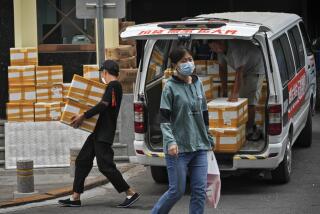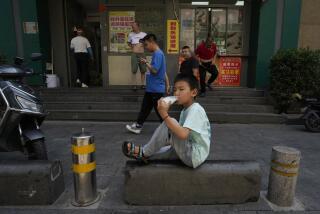Warning Signals Flash as China’s Economy Heats Up
- Share via
PEKING — China is trumpeting near-record economic growth in the first half of 1988 but has acknowledged danger signals that could stop expansion.
The Economic Daily said Friday that industrial output in the first six months rose 17.2% more than the same 1987 period, the second-highest figure for the half-year in the last decade. In the four coastal provinces of Jiangsu, Fujian, Guangdong and Shandong output soared by an average of 26.9%.
The newspaper said rapid growth had greatly increased the supply of goods and helped to reduce shortages, creating a good environment for the sensitive but vital reform of the country’s irrational price system.
Growth Not Uniform
But a Western diplomat said the economy was overheated, with shortages of coal and oil, transportation and raw materials worsening as output lagged behind that of industry.
Growth is not shared across China. Official figures showed that industrial output in Tibet, for example, showed no increase at all in June over the same month last year.
“The coastal areas are prospering at the expense of inland, whose factories do not have the money to buy raw materials on the open market. They are idle much of the time,” the diplomat said.
One element of the reforms launched by senior leader Deng Xiaoping in 1978 is to reduce state allocation of raw materials and put more on the free market, where prices are much higher.
The Economic Daily quoted economists as saying that these growing shortages had led to an increasing reliance on imported raw materials, with the processing industry growing too fast.
They also noted a serious shortage of bank credit and growth of just 5.2% in the transport sector, worsening existing shortages.
The daily gave a vivid account on Friday of how China’s railway system is near breaking point.
Crowded Trains
It is having to carry 1.1 billion people a year, nearly four times as many as in 1958 but with capacity that has risen only 270% since then.
Trains are overloaded to nearly double capacity, thousands of farmers in Sichuan province have to travel in boxcars for lack of passenger trains and travelers are squeezed into an average 3.2 square feet, unable to get a drink of water or reach the toilet.
On May 3, China’s railways carried the highest number of passengers in history on a single day--3.96 million.
The crush is a result of prosperity--companies holding exhibitions, farm laborers traveling to cities to work, newly rich peasants going on tours for the first time.
Takes a Sober View
The diplomat said Communist Party leader Zhao Ziyang, overlord of the economy, was happy with the rapid growth.
“The economy is overheated, but he thinks the problems are manageable. Rapid growth is better than no growth.”
A more sober view was given by Liu Guoguang, vice president of the elite China Academy of Social Sciences in Friday’s People’s Daily who said the economy had been growing too fast since 1981 and the speed should not exceed 10%.
He said the main cause of China’s inflation was too much money and credit, which had fueled excess consumption and consumer spending. He said economics that used deficit spending to stimulate the economy were only applicable in countries with idle capital and idle industrial capacity, while China was short of both.
“We must slow the growth of the economy to weaken the pressure of inflation,” he added.
More to Read
Sign up for Essential California
The most important California stories and recommendations in your inbox every morning.
You may occasionally receive promotional content from the Los Angeles Times.










